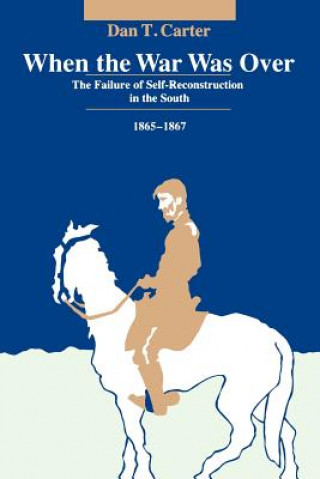
Kod: 11527008
When the War Was Over
Autor Dan T. Carter
Emory historian Carter, author of the classic Scottsboro: A Tragedy of the American South (1969), has painstakingly examined a subject on which there is near-unanimity - the failure of postwar Southern leadership in the brief peri ... więcej
- Język:
 Angielski
Angielski - Oprawa: Miękka
- Liczba stron: 369
Wydawca: Louisiana State University Press, 1985
- Więcej informacji o książce

Zobacz książki o podobnej tematyce
-

George Wallace
117.85 zł -1 % -

Strom Thurmond's America
89.84 zł -5 % -

President Like No Other
88.74 zł -7 %
Podaruj tę książkę jeszcze dziś
- Zamów książkę i wybierz "Wyślij jako prezent".
- Natychmiast wyślemy Ci bon podarunkowy, który możesz przekazać adresatowi prezentu.
- Książka zostanie wysłana do adresata, a Ty o nic nie musisz się martwić.
Więcej informacji o When the War Was Over
Za ten zakup dostaniesz 75 punkty
 Opis
Opis
Emory historian Carter, author of the classic Scottsboro: A Tragedy of the American South (1969), has painstakingly examined a subject on which there is near-unanimity - the failure of postwar Southern leadership in the brief period of mild Presidential Reconstruction (1865-67) - in order to make a slight but significant correction: the leaders were not die-hard Rebels (or plantation elite) but conservatives of varied background; a substantial number were ready to support industrial development and ("even more surprisingly") development of efficient small-scale farming. But they were undone by ingrained Southern fear-and-dread of blacks, which manifested itself in terror of insurrection; by failure to anticipate Northern shock at the coercive Black Codes of 1865-66; and by Democrat Johnson's alienation of Republican congressional moderates in then vetoing civil rights legislation. (The outcome: Congressional or Black Reconstruction.) Carter develops this argument on several fronts. One is the nature of the leadership: Johnson's seven Southern gubernatorial appointees were neither secessionists (all had opposed secession until late 1860) nor Union loyalists (i.e., they were generally acceptable to the South); more crucially, the white Southerners elected to Congress in the fall of 1865 - and denied seats - were not unreconstructed RebeLs every one (as charged by W.E.B. Du Bois and repeated by historians since) but a conservative mix (of whom "only seven had been secessionists"). On another front, white Southern willingness "to accept almost any form of government that would bring order to a disordered land" was overborne by a tradition of extra-legal repression and Johnson's lack of clear, firm racial policies. Finally, economic self-reconstructionists faced many a dilemma: if, for instance, states repudiated their debts (as the federal government demanded), what would happen to private debts? if private debtors were allowed to postpone repayment (as impoverished citizens demanded), would this not delay recovery? In shading the usual grim picture, Carter confesses himself more depressed: the best that moderate, practical, conciliatory Southerners could do was not very much. As a revised interpretation, however, this has ramifications for any treatment of the Reconstruction period - even one as cut-and-dried as Burke Davis' The Long Surrender (below). (Kirkus Reviews)
 Szczegóły książki
Szczegóły książki
128.09 zł
- Pełny tytuł: When the War Was Over
- Podtytuł: The Failure of Self-Reconstruction in the South, 1865--1867
- Autor: Dan T. Carter
- Język:
 Angielski
Angielski - Oprawa: Miękka
- Liczba stron: 369
- EAN: 9780807112045
- ISBN: 0807112046
- ID: 11527008
- Wydawca: Louisiana State University Press
- Waga: 460 g
- Wymiary: 151 × 228 × 24 mm
- Data wydania: 01. April 1985
Ulubione w innej kategorii
-

Dune
34.73 zł -33 % -

Haunting Adeline
125.38 zł -1 % -

Berserk Deluxe Volume 2
211.92 zł -1 % -

White Nights
15.25 zł -23 % -

Powerless
48.58 zł -11 % -

Atomic Habits
57.31 zł -28 % -

Dune Messiah
46.17 zł -3 % -

Berserk Deluxe Volume 3
217.44 zł -3 % -

One Day
32.52 zł -36 % -

Berserk Deluxe Volume 1
211.12 zł -2 % -

Iron Flame
60.93 zł -28 % -

Surrounded by Idiots
36.63 zł -28 % -

Harry Potter and the Prisoner of Azkaban (Minalima Edition)
169.86 zł -2 % -

Gravity Falls Journal 3
89.14 zł -

Heaven Official's Blessing: Tian Guan Ci Fu (Novel) Vol. 1
85.32 zł -5 % -

The Creative Act
99.88 zł -15 % -

Dune
47.18 zł -23 % -

Hunting Adeline
126.08 zł -4 % -

A Little Life
46.87 zł -14 % -

Children of Dune
46.57 zł -2 % -

Heaven Official's Blessing: Tian Guan Ci Fu (Novel) Vol. 2
77.49 zł -14 % -

Bungo Stray Dogs, Vol. 8 (light novel)
65.55 zł -4 % -

Percy Jackson and the Olympians 5 Book Paperback Boxed Set
184.92 zł -4 % -

Solo Leveling, Vol. 1
86.43 zł -3 % -

The Prisoner's Throne
44.76 zł -12 % -

Court of Thorns and Roses
43.26 zł -15 % -

Cry Baby Coloring Book
47.18 zł -1 % -

Fourth Wing
73.68 zł -12 % -

Icebreaker
35.03 zł -26 % -

Berserk Deluxe Volume 6
217.44 zł -3 % -

Avatar, the Last Airbender: The Kyoshi Novels (Box Set)
168.65 zł -2 % -

The 48 Laws of Power
98.17 zł -14 % -

House of Leaves
123.67 zł -3 % -

Twisted Lies
37.64 zł -26 % -

Dune Messiah
49.48 zł -13 % -

No Longer Human
58.32 zł -5 % -

48 Laws Of Power
60.93 zł -28 % -

Twisted Games
37.64 zł -26 % -

Caraval Paperback Boxed Set
174.98 zł -3 % -

Solo Leveling, Vol. 2
88.44 zł -

Open Circuits
169.05 zł -2 % -

Berserk Deluxe Volume 5
156 zł -30 % -

Heaven Official's Blessing: Tian Guan Ci Fu (Novel) Vol. 3
79.20 zł -12 % -

Berserk Deluxe Volume 4
200.68 zł -11 % -

Court of Mist and Fury
36.43 zł -26 % -

SOLO LEVELING V08
88.14 zł -2 % -

English File Upper Intermediate Multipack A (4th)
100.28 zł -

CHAINSAW MAN V14
43.46 zł -21 % -

Before the Coffee Gets Cold
33.82 zł -26 %
zadowolonych klientów
Od roku 2008 obsłużyliśmy wielu miłośników książek, ale dla nas każdy był tym wyjątkowym.
Copyright! ©2008-24 libristo.pl Wszelkie prawa zastrzeżonePrywatnieCookies



 21 milionów książek
21 milionów książek Dostawa 10.99 zł
Dostawa 10.99 zł (32) 444 93 66 (8-15.30h)
(32) 444 93 66 (8-15.30h)